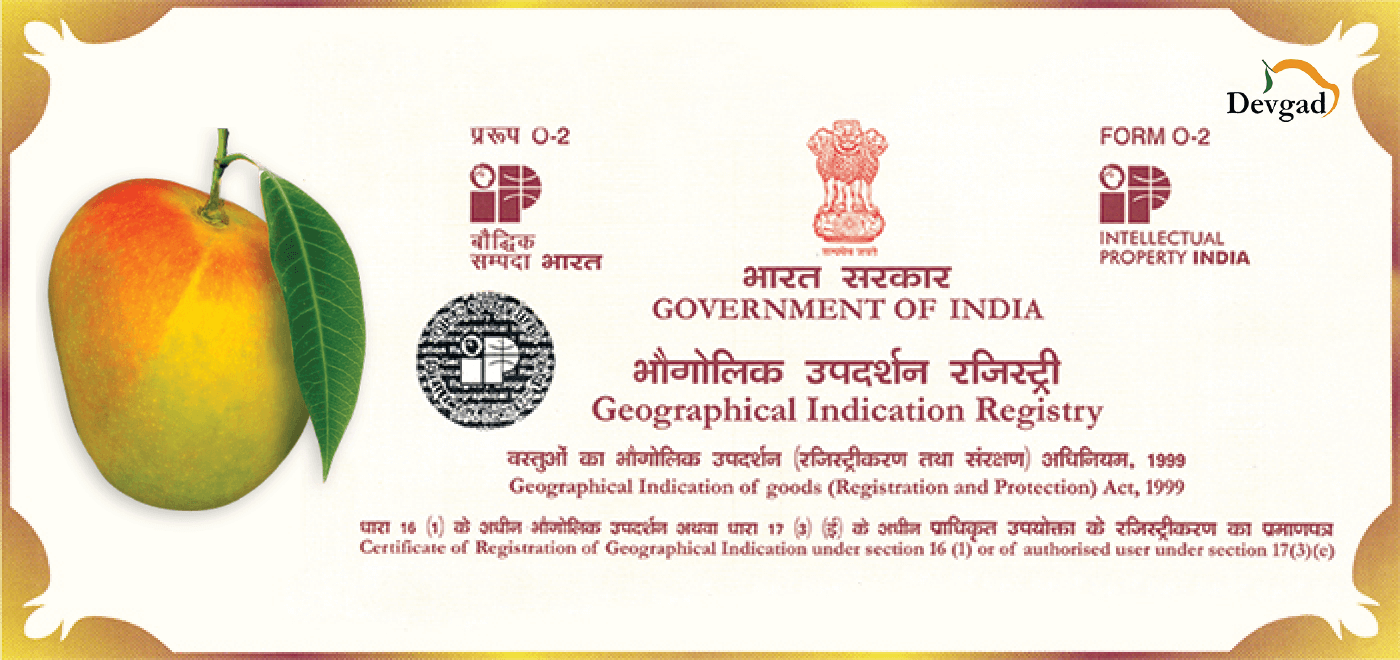
The Alphonso is the most loved mango, and mainly it is produced in the Southern region of Maharashtra Konkan. Recently, the Alphonso mango won its geographical indication (GI) tag. Continue reading Devgad Alphonso Mango Got Its Very Own GI Tag

The Alphonso is the most loved mango, and mainly it is produced in the Southern region of Maharashtra Konkan. Recently, the Alphonso mango won its geographical indication (GI) tag. Continue reading Devgad Alphonso Mango Got Its Very Own GI Tag
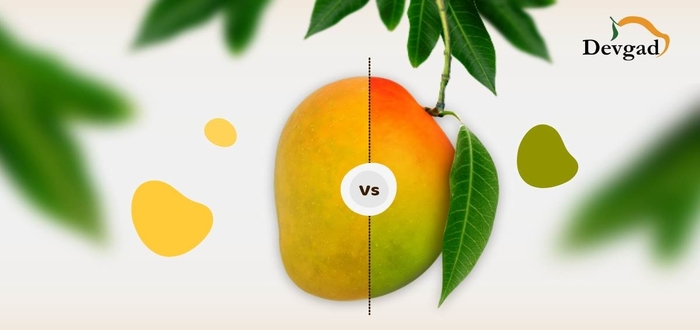
Mango is India’s favourite fruit, and within the entire range of mangoes, Alphonso Mango is India’s favourite mango. Many Indians, young and old, love the Alphonso Mango for its amazing aroma and its superb taste. Continue reading How to Identify The Real Devgad Alphonso Mango
Pune: Mango sellers from Ratnagiri and Devgad in Sindhudurg who have set up stalls at Market Yard and other spots in the city say they are forced to sell their produce at lower costs following steep competition from Alphonso sellers from Karnataka.
As a result of this, Alphonso mangoes from Konkan, which sold for as high as Rs 1,000 per dozen last week, have dropped to Rs 400-800 a dozen. To make things worse, the growers are now complaining that the sellers from Karnataka are misleading consumers and selling their ware as Devgad or Ratnagiri Hapus, catching customers unawares as only a few are able to differentiate Alphonso mangoes from Konkan and those from Karnataka.
According to the figures provided by Agricultural Produce Marketing Committee (APMC), till date, 1,62,216 boxes of Alphonso mangoes arrived in the market from Karnataka as compared to 54,074 from Konkan. Similarly, of the juicy Payri variant, only 3,699 baskets arrived from Konkan as compared to 11,097 from Karnataka.
Officials from Maharashtra State Agriculture Marketing Board said that Alphonso mangoes have thin skin as compared to their counterparts from Karnataka. This variant has a strong flavour and orange-yellow pulp and is roundish in shape.
An official said, “If one cuts an Alphonso variant from Konkan, it emanates strong aroma unlike the one from Karnataka.” The official also said that the Karnataka Alphonso mangoes, which are being sold in the State currently, are of the same variant as that of Konkan, from saplings which were once planted in Karnataka.
He added, “However, the red laterite rock and salt content in the air due to proximity to the seashore in Konkan gives Alphonso mangoes found here its distinct flavour.”
Uday Khanwilkar, a mango grower and seller in the city, claimed that Karnataka variants have a thick covering and a faint aroma. Another grower, Dheeraj Bane, who has set up a stall in the MSAMB premises at Market Yard, said that Alphonso mangoes from Devgad have a distinct aroma and flavour which the Karnataka variant lacks.
Jyoti Bolande added that mango growers from Konkan area are currently facing steep competition from sellers from Karnataka and that they are forced to sell mangoes at a lower price. “If consumers insist on buying mangoes at a cheaper rate, they are likely to get mangoes from Karnataka as these mangoes are sold at as low as Rs 200 per dozen. The State government needs to take some measures to stop this,” said Bolande.
Senior MSAMB official added that unless the Alphonso mangoes from Ratnagiri, Sindhudurg, Thane and Raigad get geographical identification, the sellers from Karnataka cannot be stopped from selling their fruits as Ratnagiri and Devgad Hapus.
Pune Agricultural Produce Marketing Committee Chairman Dilipkumar Khaire said that as compared to last year, due to climatic condition fewer mangoes have arrived in the market. He added that APMC has issued instructions to traders to avoid using hazardous chemicals to ripen the mangoes.
Every year in the mango season, it is common to see a debate on chemical ripening, calcium carbide, FDA raids, and some traders saying it is not possible to ripen mangoes otherwise. Devgad Taluka Amba Utpadak Sahakari Sanstha Ltd is completely against any chemical ripening because and it ruins the quality of fruit and is hazardous to humans. We ripen all our Devgad Alphonso mangoes only naturally in grass hay and that is why we can vouch for its quality.
The issue of artificial ripening happens because of the way the market is structured. Mango that comes into the market first gets sold at a higher price. This brings a tendency to pull in mangoes as fast as possible, ripen them artificially and sell them off as soon as possible. So to ripen them fast, the market uses calcium carbide, that is not only a banned product; it is also hazardous to human beings as it causes cancer.
It is a point to note that calcium carbide does not ‘ripen’ mangoes. It is important for customers to understand that ripening is a biochemical reaction. When the fruit reaches maturity, it starts producing ethylene gas, along with slowly breaking down acids in the fruit, and converting starch into sugar. It is not humanly possible to accelerate this natural biochemical reaction in the fruit.
What calcium carbide does for mangoes is that it produces acetylene gas, which creates heat. Acetylene’s main application is in welding and as a fuel. When generated from calcium carbide, acetylene contains toxic impurities that affect the neurological system. When acetylene fills up the box of mangoes, it heats the fruit from outside. Mangoes start losing their green colour and turn yellow from outside.
This is the same reaction that happens when a coloured cloth is kept in the sun for some days and loses its colour.
Mangoes turn yellow but do not ripen. Some starch near the skin of mangoes is broken into sugar and then mangoes take a uniform yellow colour. For the customer, the mango looks yellow, he/she thinks it is ripe and buys it at whatever cost. However, the taste is not what the customer expecting for the price she paid. Such mangoes taste pathetic.
Because of the unique taste of Devgad Alphonso, almost all mangoes that look like Alphonso are sold in the market as Devgad. People have known the name of Devgad as producing Alphonso mangoes of top quality. But when they eat such artificially ripened mangoes that are sold to them as Devgad, and they taste pathetic, our name takes a beating.
Another point to note, none of our farmers use calcium carbide or for that matter any chemical to ripen mangoes.
If you are not registered yet, please click http://bit.ly/devgadmangoregistration to register for Season 2019.
You know it takes nine months for a human being to be born. Did you know it takes the same number of years for your Devgad Alphonso Mango to take birth? We are sure you didn’t, did you? You and patrons like you have loved the Devgad Alphonso Mango for years, but many of you were curious about how divine fruit grows. So we thought as we prepare for the mango season 2017, we should take you through the nine-year journey that your favorite Devgad Alphonso Mango goes through before it comes to you as a juicy fruit. Read on to know the Journey of The Devgad Mango.
Well, one fact to start with. Devgad Mango does not grow out of a seed. If you plant the seed after eating a Devgad Mango fruit, you will get a mango tree, but it will bear mango fruits of a different variety and taste. The journey of the Devgad Mango begins as a small twig cut out from the mother plant… like this…
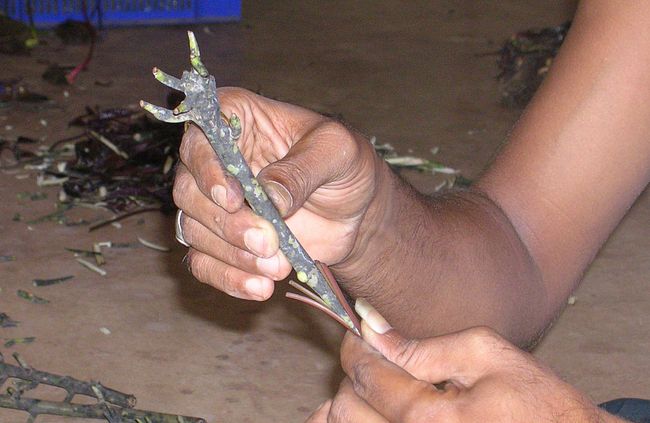
It is then grafted on to a stem that has grown out of a mango seed of a sturdy variety…. like this… Some times one twig is planted into a combination of two stems from two seeds…
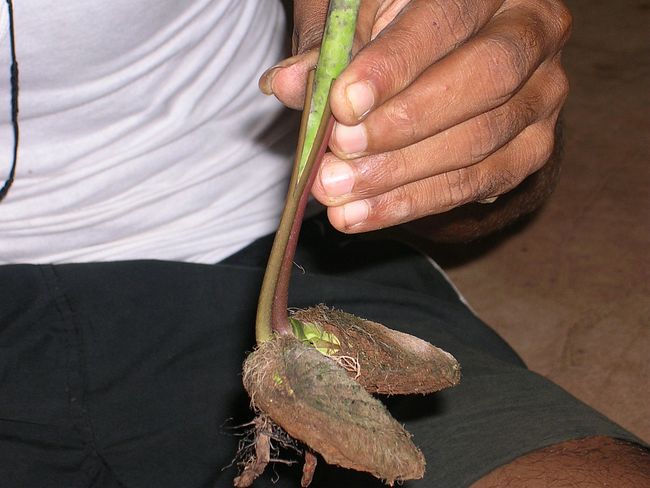
The graft is then tied up and wrapped with plastic tape, neatly covering it from all sides, like below. It is similar to tying up a wound of a human being or an animal and needs similar care.
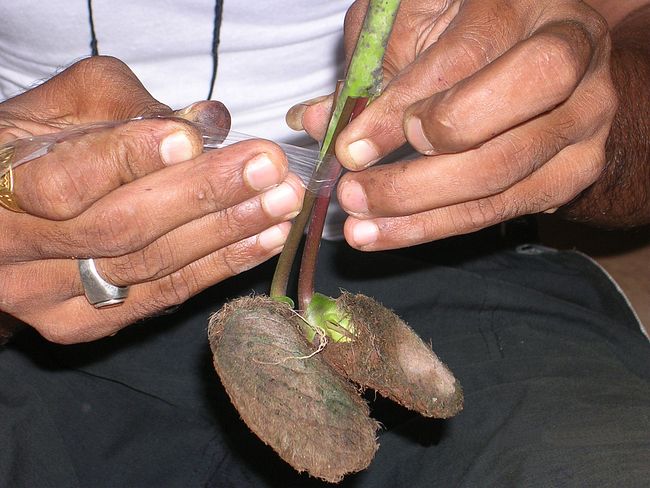
It is planted into a plastic bag and put under intensive care for the next four years…
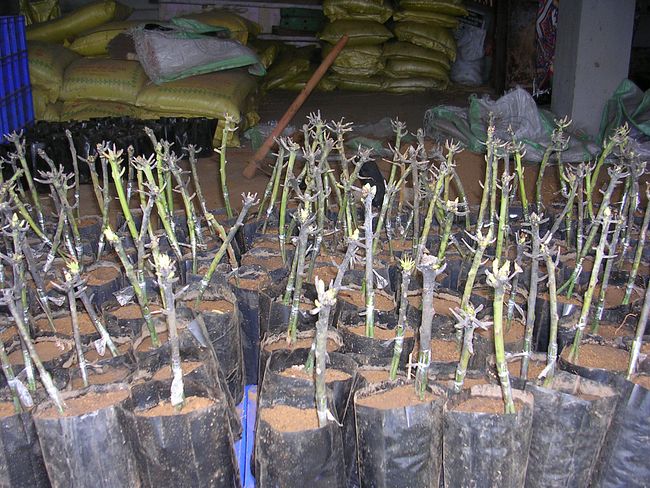
It is kept in the bag for some months and then planted into a tin-can until it grows to a height of about 5 feet till about the fourth year. Only three out of five survive till the fourth year. In the fourth year, the bags are cut out and the little tree is planted in the orchard. Only four out of five survive till the sixth year till they become like this…
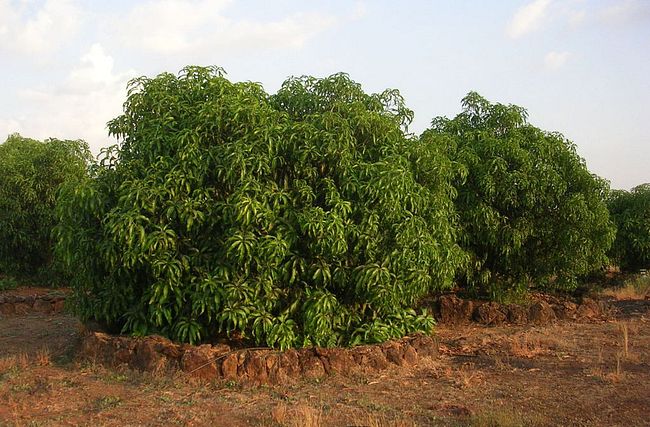
Over the next three-four years, the tree needs good care, with regular pruning so that it grows sideways, equally all around, like this
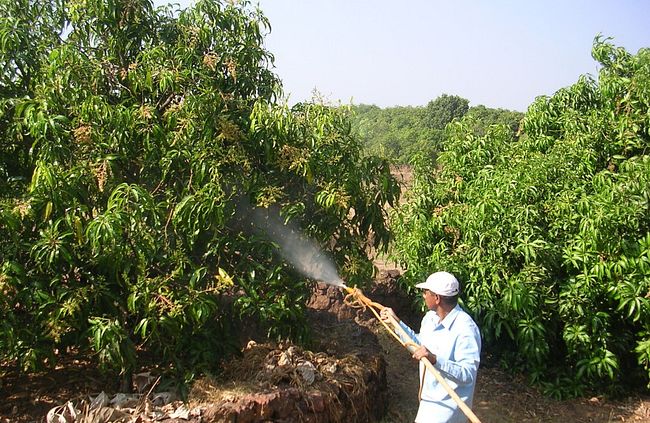
Around the end of the eight-year, the tree starts to blossom, like this…
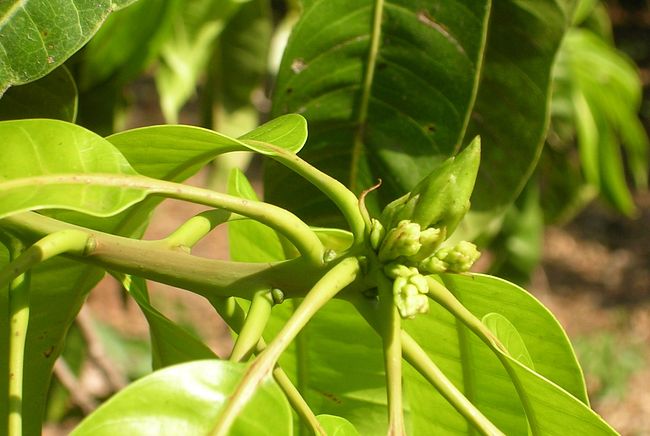
and this…
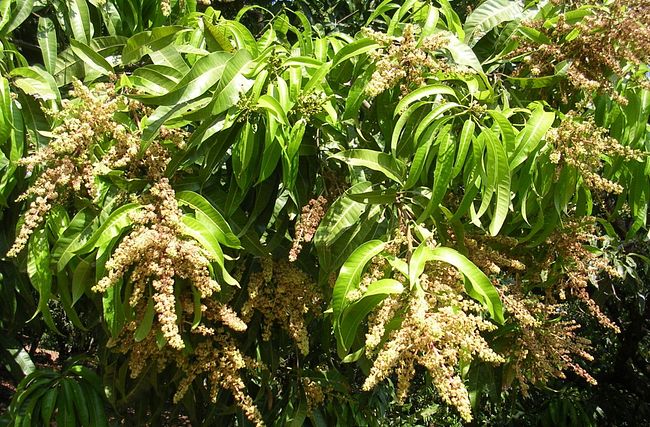
A Devgad Mango tree in full bloom looks like this…
It starts bearing good fruit since the ninth year. Since its a grafted tree and well maintained, you have fruits hanging between 0 to 25 feet from the ground, like this..
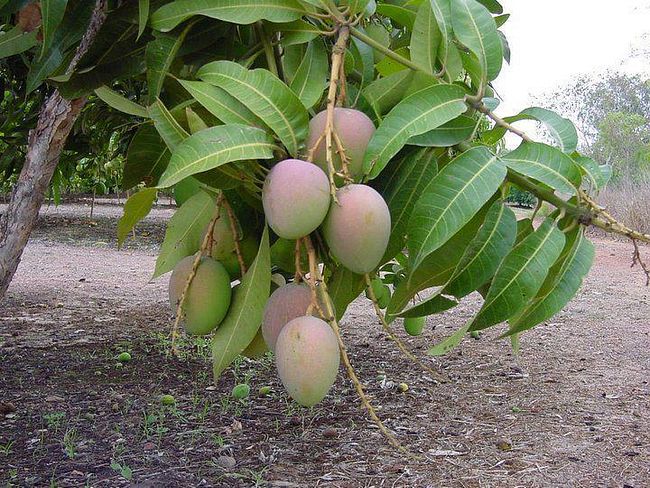
and this…
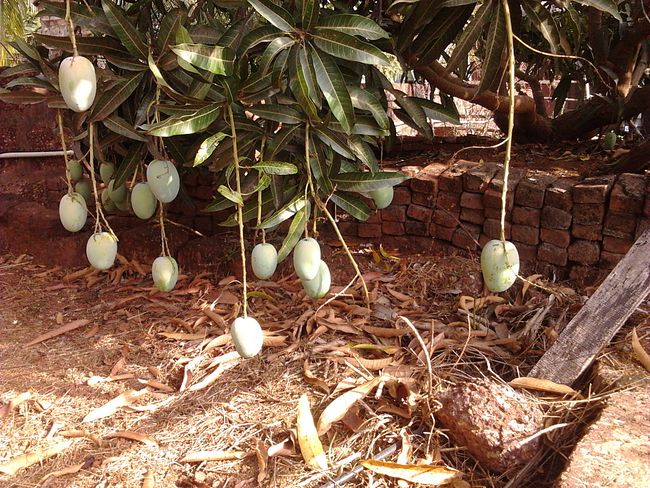
and this…
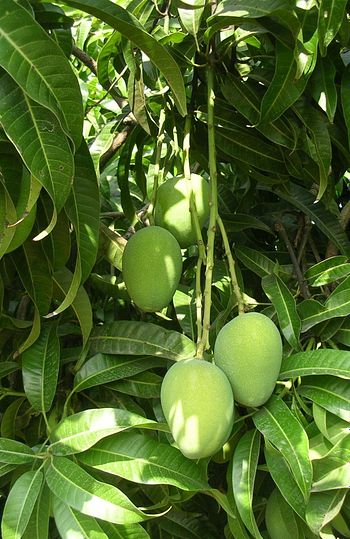
The maturity of a Devgad Mango is defined in India’s traditional ‘anna’ system of currency, where 16 annas make up a rupee. A ’16 anna Devgad Mango’ is a 100% mature mango. Devgad Alphonso fruits are harvested at 14 anna level of maturity, by expert harvesters, who have acquired, by experience, the skill of identifying mature fruits from distances that can go as long as 25 feet. The fruit is harvested using a tool called as ‘zela’ in the local language. It is a loose nylon-net basket held by a metal ring and attached to a bamboo pole. A sharp V-shaped cutting tool is at the front of the ring. The harvester, after identifying a mature fruit, holds the zela from one end and carefully raises its basket-end, till the fruit is lowered into the basket and its stem rests against the V-shaped cutting tool, at a point over 6-9 inches from the fruit. Then the harvester tugs at the zela in a specific and careful manner, which does not disturb other fruits held from the same branch, does not result in any pull for the branch and yet cuts the stem from which the fruit is held, ensuring that a significant part of the fruit stem is still intact with the fruit. The fruits are taken out, and laid into a crate and immediately moved into a cool, shady place so as to shield the fruits from sunlight and heat. The crates with harvested fruits look like this.
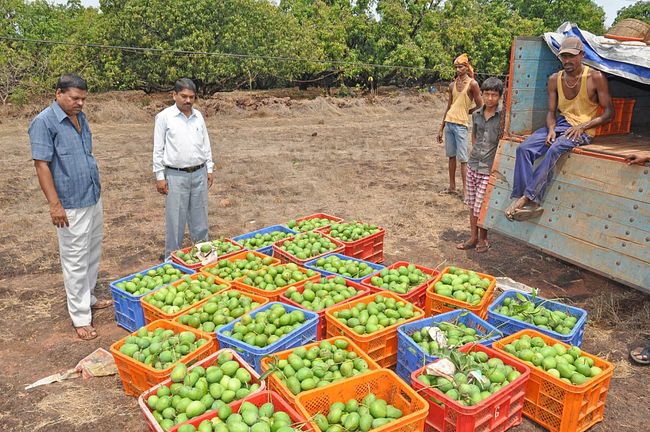
Some farmers take the harvested fruit crates to their homes and do the sorting there. For sorting at home, the crates are emptied on a paper bed, like this
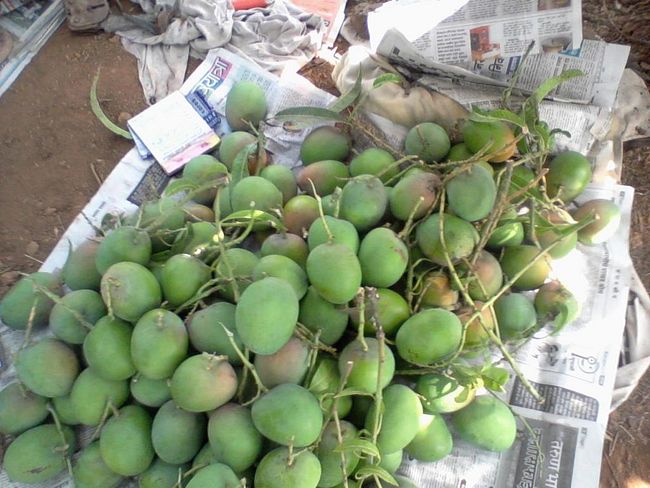
and this…
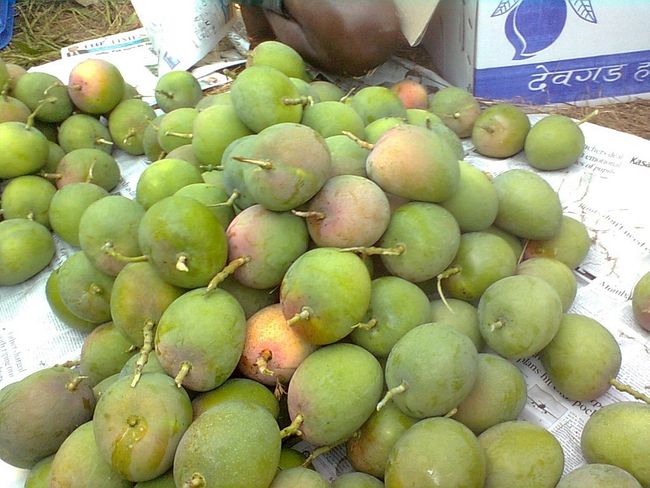
And the good, marketable fruits are arranged in a neat line for observation over the next two days, like this…
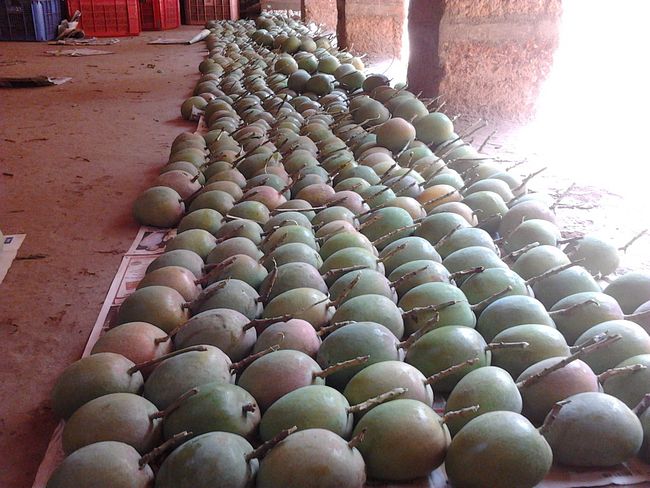
Most farmers get the crates of harvested fruits directly to the co-operative society, where they are graded, sorted and the farmer is paid accordingly. When the farmers get their fruits to society, they are first sorted in front of the farmer like this. The one sitting on the chair is the farmer.
In sorting, each fruit is manually checked for hit marks, bird fly stings, pest scrape marks, sap burns, and other anomalies. After sorting, the mangoes are graded according to their weights, like this.
Once graded, they are dipped into an anti-fungal solution and then arranged into crates and covered from all sides with hay, and kept for ripening, like this…
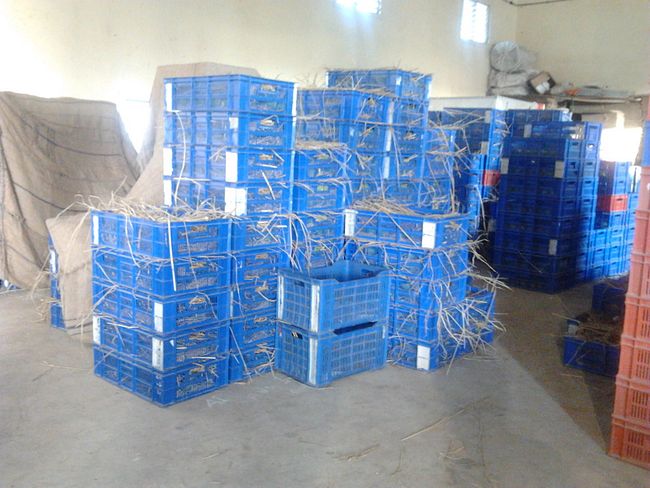
If the weather is a bit bad, the crates are covered or if the weather is very bad, the crates are moved to a temperature-humidity controlled building, like this…
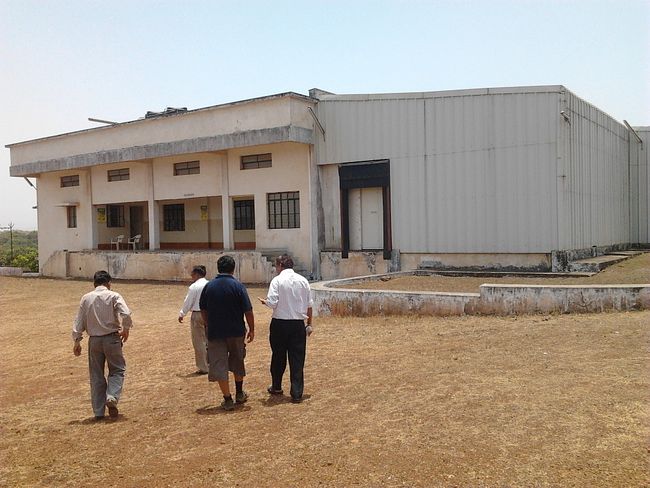
When the fruits show signs of yellowing over the next two to five days, they are taken out and packed in wooden crates like this…
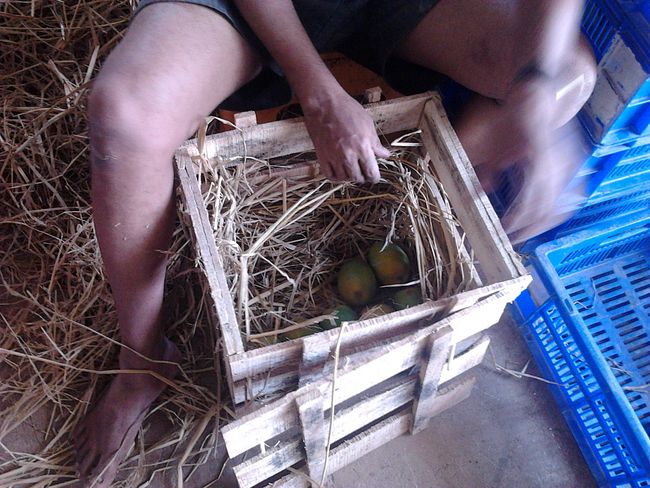
this…
and this…
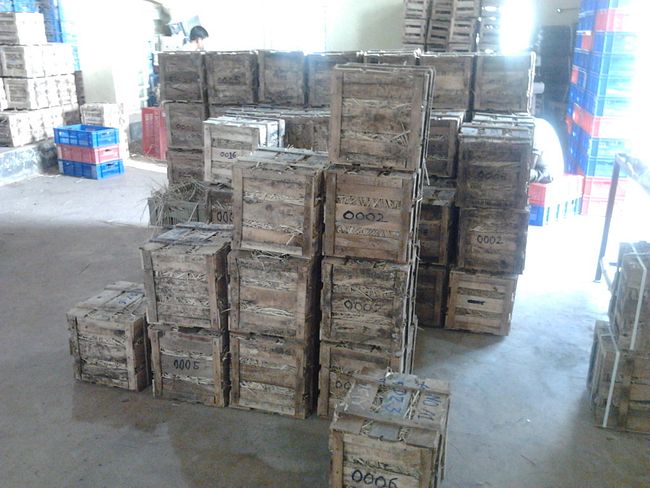
or into paper boxes like this…
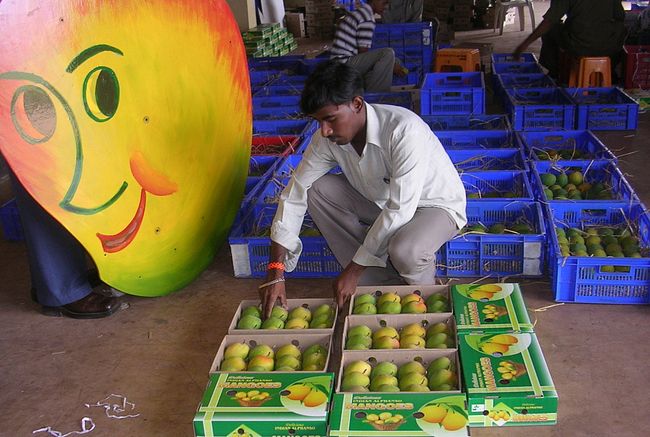
And the fruit is dispatched to customer’s homes, either by ST parcel, or through a truck or tempo, or through relatives’ cars or bus or courier. It’s ripening process continues during the journey and becomes ready to eat in the next two to five days. A fully ripened, ready-to-eat Devgad Mango looks like this.
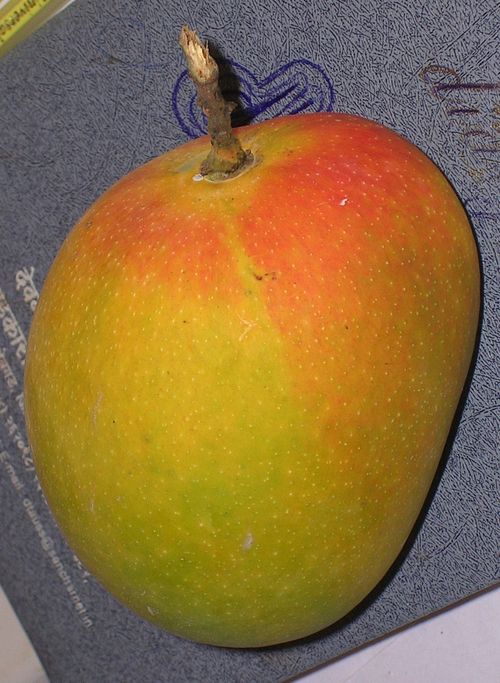
Next time you enjoy your Devgad Mango, do remember the nine years of delicate care it took to grow this divine fruit. If you liked our presentation, please leave your comments below and also forward it to your friends. If you have any more questions, please ask them in the comments.
If you are not registered yet, please click http://bit.ly/devgadmangoregistration to register for Season 2019.
We are pleased to inform that we have started accepting orders for Mumbai and Pune. As you are aware from our earlier posts that the production of Alphonso Mango has been affected and so we will be extremely short of supply. Please bear with us that we will not be in a position to supply mangoes for all orders. Please visit devgadmango.com to place your orders.
Kindly note that due to the extreme shortage, we will process orders only on prior payment. There has been a huge loss of our member farmers due to cyclones and rainstorms, and so prior payment will help us pay our members immediately. We have activated a cash-pick up facility for Mumbai and Pune. We have tied-up with cash collection company Gharpay, which will collect money on our behalf and will give you the receipt.
Also note that on Monday 9 April 2012, we have also started sale centers in Pune and in Mumbai at Thane, Dadar and Girgaon looked after by our personnel. We will send some mango there that will be immediately available. Below are the addresses and the numbers of our personnel available there.
Pune Sale Centre
Bendre Blocks, Sadashiv Peth, Next to Perugate Police Chowky. (Directions: From Perugate Police Chowky, as you start traveling towards Hatti Ganapati, enter the first gate on the left side): Contact: 8600411173
Mumbai Sale Centres:
Thane:
Kamate Bhavan, Sambhaji Road, Vishnunagar, Opposite Satyam Collection, Naupade, Thane West. Contact: 9422584166
Dadar:
Sunshine Heights, Shop No. 1, P.L. Kale Guruji Marg, Opposite, Samarth Vyayam Mandir, Jain Health Centre Lane, Dadar West. Contact: 7350018691
Girgaon:
Tarabhuvan, Ground Floor, Shop No. 10, Nanubhai Desai Road, Khetwadi, Third Lane, Near Wilson Highschool, Girgaon: 4
8600411940, 9892136449
It has been a very devastating time this season. In December 2011, we were looking forward to a decent crop this Alphonso Season 2012. Then all of sudden Cyclone Thane swept across Southern Indian. It was the strongest tropical cyclone of 2011. While everything was going fine till then, the after-effects of the cyclone took away the winter and cold weather. We were expecting winter to stay till mid-January and then start getting warm, which would have helped good production of the mango fruits. However, after the cyclone, it started to get warm immediately and remained warm till January end. This adversely affected the production of mangoes.
As fate may have it, it started getting cold in February and it stayed cold till the last week of March. This pushed the season further and the expectation was that Season 2012 will start by 7-10 April 2012 at least. As the cold stayed back for a longer time, it created a favorable atmosphere for the Thrips pest, which wreaked havoc on the trees. The new species of Thrips discovered last year made its appearance this year too and there is no pesticide available on it as yet.
Then adding insult to injury, a strong mini-storm swept across the Alphonso Mango producing belt in Devgad and Ratnagiri, April 2 and 3. It uprooted many mango trees and took down a huge amount of the standing mango crop. See the photo below. The storm also brought sandstorms and rains along with it, with created widespread devastation.
In totality, this has been a devastating season for the mango producing farmers in Devgad and the entire Konkan region. Whatever mangoes have been left on the trees will mature by April 20 and barely 30 days after that the Season 2012 of Devgad Alphonso Mango will end!
We have a heavy heart as we write this season update. We had expected the season to start by 15 March or latest by 25 March this year. However, prolonged winter and a pest attack again this year has pushed the season forward. With cold setting over the last fortnight across Devgad, fruits have been falling off the trees and there was no surety of the quality of the fruits leftover. Because of this, we will not be able to give mangoes to you in March as promised and we are sorry for that. We are now hoping the season will start after 7 April.
However, we expect the season to be very short, a maximum of 45 days, and deeply regret that we may not be able to supply mangoes to everyone. You would see mangoes in the mandis soon, but as you know under the Devgad Mango brand, we only supply the best and quality assured Devgad Alphonso fruit, which will be short in supply.
As a priority, when the season starts, we will supply mangoes first to the people who enrolled in Mango Bonds, starting with people who have already paid. Then we will supply to those who opted for cash/cheque pick up, but we have not been able to collect money from them yet. We have been trying to get a cash/payment collection partner, and it took us a long time to get a reliable partner.
Those who opted for a bank transfer and cheque courier, are requested to kindly make their payments so that we can process your Mango Bond orders.
Thereafter we will open the orders for everyone. In Pune, we have made arrangements for home delivery, while in Mumbai we have made arrangements for pick up centers at around 14 locations of a courier company! This is a difficult time for Alphonso mango growers as Nature is being a bit unfavorable. Last year it was the aftermath of the Tsunami, which disturbed the earth’s rotation and brought rains in December and cold waves in February. This year it was the aftereffects of Thane Cyclone, which took away winter in December end and brought it back in March. We request your support as we battle it out and struggle to get a good Alphonso Mango production!